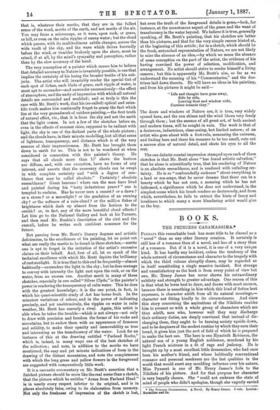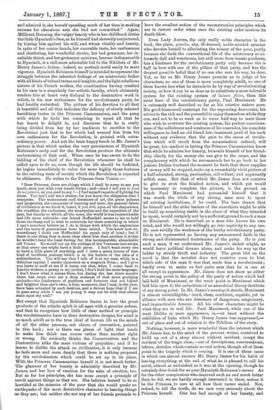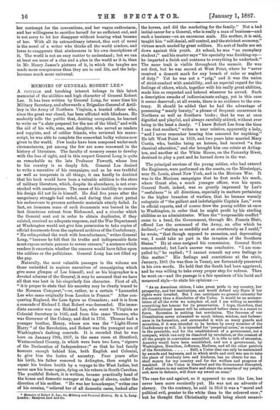BOOKS.
THE PRINCESS CASAMASSIMA.* PERHAPS this remarkable book has more title to be classed as a " novel" than as any other literary creation. It certainly is still less of a romance than of a novel, and less of a story than of a romance. But if it is a novel, it is one of a very unique kind. It has hardly any incident, unless the tendency of the whole network of circumstance and character to the tragedy with which the third volume abruptly closes, may be regarded as in itself constituting a single massive incident. But strange and unsatisfactory as the book is from every point of view but one, Mr. Henry James has never shown his extraordinary subtlety and strength to greater advantage. One reason of this is that what he loves best to draw, and draws with most success, because there is something in him which this kind of fiction best expresses, is character adrift from all its natural moorings,— character not fitting kindly to its circumstances. And since this story concerning the aspirations of the Nihilists enables him to present us with a whole group of characters which are thus adrift, men who, however well they may discharge their ordinary duties, are deeply convinced that instead of dis- charging them, they ought to be turning society upside down, and to be despisers of the modest routine by which they earn their bread, it gives him just the sort of field of which he is prepared to make the best use. The hero is one Hyacinth Robinson, the natural son of a young English nobleman, murdered by his light French mistress in a fit of rage and jealousy. He is brought up by a most excellent little dressmaker, who had once been his mother's friend, and whose habitually conventional romance and personal meekness are the last qualities in the world that would exert any moulding influence over his nature. Miss Pynsent is one of Mr. Henry James's foils to the Nihilists of his picture. And for that purpose her character is very happily chosen. She " could not embrace the state of mind of people who didn't apologise, though she vaguely envied
M•ac The Princess Casemassima. A Novel, By Henry James. 3 vols. London millan and 00.
and admired it, she herself spending much of her time in making excuses for obnoxious acts sbe had not committed." Again, Millicent Henning, the vulgar beauty who in her childhood dirties the little Hyacinth's face, as he himself had shrewdly conjectured, by kissing him against his will, and whose vitality and beauty, in spite of her coarse hands, her execrable taste, her restlessness and chattering, her wonderful stories, her bad grammar, her in- satiable thirst, and her grotesque opinions, become indispensable to Hyacinth, is a still more admirable foil to the Nihilists of Mr.
Henry James's fiction ; indeed, no portrait could easily be more vigorous. Hyacinth Robinson himself is intended to represent the -struggle between the inherited feelings of an aristocratic father with all kinds of refined tastes and insights, and the light rebellious -nature of his French mother, the combination having resulted in his case in a singularly fine artistic faculty, which ultimately renders him at heart very disloyal to the destructive work in -which, in his raw enthusiasm for the revolutionary party, he had hastily embarked. The picture of his devotion to all that is beautiful and all that indicates the delicacy of slowly selected hereditary tastes in the Princess Casamassima, and the pang with which he finds her conspiring to upset all that he has learnt to delight in, and discovers that he is really being divided from her by her readiness to sacrifice to the Revolution just that in her which had weaned him from his own enthusiasm for the Revolution, is painted with extra- ordinary power. And not the least happy touch in Mr. James's picture is that which makes the very genuineness of Hyacinth Robinson's early zeal for the Revolution produce the ultimate undermining of that zeal. When once he has sworn to do the bidding of the chief of the Revolution whenever he shall be -called upon to do so, even though his life should be forfeited, he begins immediately to value far more highly those features in the existing state of society which the Revolution is expected to obliterate. He writes to the Princess from Venice :-
`0 Dear Princess, there are things which I shall be sorry to see you -touch, even you with your hands divine ; and—shall I tell you le fond de ma penede, as you used to say ?—I feel myself capable of fighting for them. You can't call me a traitor, for you know the obligation that I recognise. The monuments and treasures of art, the great palaces -and properties, the conquests of learning and taste, the general fabric of civilisation as we know it, based, if you will, upon all the despotisms, the cruelties, the exclusions, the monopolies and the rapacities of the past, bat thanks to which, all the same, the world is less impracticable and life more tolerable—our friend Hoffendahl seems to me to hold them too cheap and to wish to substitute for them something in which I can't somehow believe as I do in things with which the aspirations and the tears of generations have been mixed. You know how ex- traordinary I think our Hoffendahl (to speak only of him) ; but if -there is one thing that is more clear about him than another it is that he wouldn't have the least feeling for this incomparable, abominable -old Venice. He would cut up the ceilings of the Veronese into strips, so that every one might have a little piece. I don't want every one to have a little piece of anything, and I have a great horror of that kind of invidious jealousy which is at the bottom of the idea of a redistribution. You will say that I talk of it at my ease, while, in a delicious capital, I smoke cigarettes on a magenta divan ; and I give you leave to scoff at me if it tarns out that, when I come back to
London without a penny in my pocket, I don't hold the same language. I don't know what it comes from, but during the last three months there has crept over me a deep mistrust of that same grudging
attitude—the intolerance of positions and fortunes that are higher and brighter than one's own; a fear, moreover, that I may, in the past,
have been actuated by such motives, and a devout hope that if I am to pass away while I am yet young it may not be with that odious -stain upon my soul."
But except that Hyacinth Robinson learns to love the great products of the artistic spirit in all ages with a genuine ardour, .and that he recognises how little of clear method or principle the revolutionaries have in their destructive designs, his mind is as much adrift as to the true ideal of human life as the minds of all the other persons, not slaves of convention, painted in this book; nor is there one gleam of light that tends to make him think one coarse rather than another right or wrong. He evidently thinks the Conservatives and the Destructives alike the mere victims of prejudice; and if he learns to dislike the attack on civilisation, it is only because he feels more and more deeply that there is nothing proposed by the revolutionists which could be set up in its place. With the Princess Casamassima herself it is not much better. The glamour of her beauty is admirably described by Mr. -James, and her love of emotion for the sake of emotion, too. But as for her principles, she has none except a principle of -revolt against things as they are. She believes herself to be so horrified at the miseries of the poor that she would prefer an • earthquake of the most destructive character to leaving things
As they are; but neither she nor any of her friends pretends to
have the smallest notion of the reconstructive principles which are to restore order when once the existing order receives its death-bloW.
Even Lady Aurora, the only really noble character in the book, the plain, gauche, shy, ill-dressed, noble-minded spinster who devotes herself to alleviating the misery of the poor, partly because she finds the conventional life of the aristocracy so ex- tremely dull and wearisome, but still more from innate goodness, has a kindness for the revolutionary party only because she is half in love with one of the pillars of that party, and has the deepest possible belief that if no one else sees his way, he does. Yet, so far as Mr. Henry James permits us to judge of his characters, no one of them is more completely adrift, no one of them knows less what he intends to do by way of revolutionising society, or how it can be so done as to substitute a more tolerable system for the existing system of laissez faire, than this same hero of the revolutionary party, Paul Maniment. He is extremely well described so far as his exterior nature goes. His good-humoured contempt for the vaponring democrats, his advice to the rich and the powerful to enjoy themselves while they can, and not to be so weak as to come half-way to meet those who wish to overturn the existing system, his perfect conscious- ness of the selfishness and weakness of his comrades, his complete willingness to lead an old friend into imminent peril of his neck without any evidence that the gain to the cause of revolu- tion which will result from the assassination ordered, will be great, his candour in letting the Princess Casamassima know that while he admires her beauty, he avails himself of her friend- ship chiefly for the money she can give to the cause, and the complacency with which he recommends her to go back to her jealous Italian husband the moment he finds that these supplies of money will be stopped, make up a remarkably vivid picture of a half-educated, strong, passionless, self-reliant, and apparently selfish man. But that of which Mr. James does not contrive to give us even the faintest notion, and which yet would be necessary to complete the picture, is the ground on which Paul Muniment had persuaded himself that it was worth the while of any strong, sane man to upset all existing institutions, if he could. The bare chance that he himself and the abler leaders of the anarchists might be able to build up something stable in the place of what they intended to upset, would certainly not be a sufficient ground to such a man as Muniment. He is described as a man who knows his own mind, and who would not willingly go into captivity to any one. He sees vividly the weakness of the frothy revolutionary party. He is not represented as having any unmeasured faith in the strong and disinterested doctrinaires of the party. He is just such a man, if we understand Mr. James's sketch aright, as would leave political dreams alone, and make his way up the ladder by steady thrift and industry. The great blot on the novel is that the novelist does not contrive even to hint which side of the man it was that made him a revolutionist ; hardly even to make us feel quite sure that he is one at all except in appearance. Mr. James does not show us either the strong point in the policy of the party of action which had laid hold of Maniment, or the weak point in Muniment which laid him open to the seductions of an anarchical theory destitute of any strong point. In Mr. James's novel as it stands, Muniment is almost unintelligible,—hard, clear, confident, capable, yet in alliance with men who are dreamers of dangerous, sanguinary, and impracticable dreams. All his other characters might be what they are in real life. Paul Muniment, while one of the most lifelike in mere appearance, is,—at least without the exhibition of links which Mr. Henry James has suppressed,— out of place and out of relation to the Nihilism of the story. Nothing, however, is more wonderful than the interest which Mr. James has, to the mind of the present writer, contrived to build up out of a story almost without incident, except the incident of the tragic close,—out of descriptions, conversations, letters, sketches which contain no real action, though all of them point to the tragedy which is coming. It is one of those cases in which one almost excuses Mr. Henry James for his habit of leaving everything at the end of what he is pleased to call his novel, almost as unfinished as it was at the opening, though he certainly does finish for us poor Hyacinth Robinson's career. As for the other conspirators who deserved such an end much better than he did, we are hardly enough interested in them, unless it be the Princess, to care at all how their career ended. Nor, indeed, to tell the truth, do we care very seriously about the Princess herself. One has had enough of her beauty, and
her contempt for the conventions, and her vague enthusiasm, and her willingness to sacrifice herself for no sufficient end, and is not sorry to let her disappear without hearing what became of her. With all its extraordinary interest, this sort of novel is the novel of a writer who thinks all the world aimless, and loves to exaggerate that aimlessness in his own descriptions of it. The world is not an easy matter to understand ; but we can at least see more of a clue and a plan in the world as it is, than in Mr. Henry James's pictures of it, in which the tangles are made more conspicuous than they are in real life, and the help- lessness much more universal.
















































 Previous page
Previous page